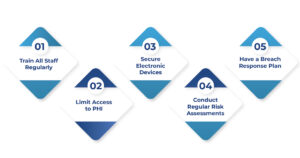Healthcare organizations need to follow HIPAA compliance standards to protect patient-sensitive health information in medical billing operations. Patient data handling entities, which include providers, billing companies, and clearinghouses, must establish three types of safeguards to secure Protected Health Information (PHI) according to regulatory requirements.
Meanwhile, the medical billing staff requires training about privacy rules, secure electronic data transmission, and unauthorized access prevention. Covered entities must execute regular audits together with risk assessments to show ongoing compliance. Here in this article, we’ll explain all about the HIPAA compliance services, its regulations and benefits in medical billing processes. Stay with us till the end and get useful insights!
What Is HIPAA Compliance?
HIPAA compliance requires organizations to follow the (HIPAA) rules, which protect patients’ private health information in the United States. HIPAA regulates how healthcare providers, together with insurance companies and other organizations, handle medical records while maintaining their security and controlling authorized information sharing. Your doctor needs your permission to share information about your condition except in cases of treatment requirements, payment needs, or legal obligations.
In addition, HIPAA compliance services require organizations to deploy multiple security measures, including password authentication and staff education about maintaining protected health information privacy. A person who violates these rules will receive severe consequences. The HIPAA creates trust by safely maintaining your personal healthcare information and keeping it confidential.
HIPAA Compliance in Medical Billing
The following text provides additional information about HIPAA compliance in medical billing:
- A medical provider must obtain patient consent before disclosing.
- The process of updating software regularly works to protect patient data security.
- Medical data protection depends on using robust passwords.
- Healthcare providers need to follow HIPAA guidelines with complete strictness.
- The encryption of data protects the safe transmission of patient records between systems.
- The verification of HIPAA regulatory compliance takes place through compliance audits.
- Secure email protocols serve as a prevention method against unauthorized data leaks.
HIPAA Compliance Requirements
The HIPAA compliance requirements establish protective rules that healthcare providers and their business partners need to follow when handling patients’ private health information (PHI). The HIPAA compliance requirements encompass four main areas which consist of Privacy Rules and Security Rules together with Breach Notification Rules and Enforcement Rules.
Furthermore, healthcare providers must follow the Privacy Rule to determine permitted PHI access and sharing and implementation. The Security Rule through password protection and encryption alongside secure network requirements to secure electronic health information (ePHI).
Hence, healthcare organizations must notify patients and the government through the Breach Notification Rule. The government uses the Enforcement Rule to both enforce compliance and administer penalties when organizations fail to follow the established rules.
HIPAA Verification Process
1. Identify the Requestor
The HIPAA compliance services start with establishing precise identification of the information requester. Verification of requestors requires obtaining their complete name together with their patient relationship and their stated reason for information access. The process becomes straightforward when the request comes from the patient yet requires additional procedures when dealing with others. The person must demonstrate proper authorization to access the requested information. This helps avoid accidental disclosures.
2. Verify Identity with Documentation
You must verify the identity of individuals who want to receive Protected Health Information (PHI) by asking for proper identification. When dealing with in-person requests always require proof of identification through government-issued documentation. Security questions and pre-established verification systems should be used for identifying callers or users who make phone or online requests.
3. Confirm Authorization to Access PHI
After identity verification, you must check whether the person has legal permission to view PHI. Patients can give permission to access their data yet additional authorization from the power of attorney or legal guardianship or a HIPAA release form might be necessary. The system must deny access to all information when documentation is missing. Always review consent forms carefully. The measures serve to safeguard patient privacy together with the legal protection of your practice.
4. Use Secure Verification Procedures
The organization needs to develop consistent procedures that securely confirm the identity of patients through all contact channels including in-person phone and online. You must use encryption on all platforms for handling electronic requests. All staff members need training to execute these procedures at every opportunity. Document each verification step performed in secured records. A standard approach prevents errors while it is maintaining proper adherence to requirements.
5. Document the Verification Process
Record the verification steps in patient records whenever PHI is shared with others. Record down the information about who made the request for data, along with verification methods and shared details. Keep authorization forms as copies in the patient records if applicable. The systematic documentation of these activities regarding PHI becomes essential during audits or disputes. The documentation proves you obeyed HIPAA regulations correctly.
Tips for Healthcare Providers about HIPPA Compliance

1. Train All Staff Regularly
The entire clinic staff must understand all patient privacy regulations. The organization should deliver periodic training to both new employees and existing staff members. This helps avoid accidental mistakes. Staff members at every level need to collaborate to protect patient information.
2. Limit Access to PHI
Staff members should only view patient information relevant for work purposes. All staff should not receive unrestricted access to PHI records. The protection against misuse becomes stronger through this approach. Fewer people with access to patient data lead to better protection of the information.
3. Secure Electronic Devices
All devices should have encryption features with lock screens and passwords enabled. A security system protecting patient information exists in case staff members lose their phones or laptops. Always update the software. Old devices containing patient data should have their data completely removed.
4. Conduct Regular Risk Assessments
System and process evaluation must happen frequently to identify any possible weak areas. Regular assessments allow you to solve problems that otherwise might cause data leaks. Performing regular checkups on your clinic’s data security systems functions similarly to medical facility routine examinations. It’s a smart habit.
5. Have a Breach Response Plan
A quick response plan becomes necessary whenever private information is lost or stolen. Report such incidents to affected patients right away and correctly handle them. Implementing such measures helps minimize damage while creating trust between patients and the healthcare organization.
Penalties For Non-Compliance HIPAA
Here are some of the penalties:
- Civil fines from $100 to $50,000 per violation
- Annual maximum penalty of $1.5 million per violation category
- Criminal fines up to $250,000
- Imprisonment of up to 10 years for severe offenses
- Mandatory corrective action plans (CAPs)
- Reputational damage and loss of patient trust
- Possible state-level penalties in addition to federal fines
- Legal costs from lawsuits and settlements
End Remarks
In conclusion, healthcare providers need to ensure HIPAA compliance billing because it shields the private medical information of patients while preserving their trust in medical services. The system provides complete privacy protection for medical records along with billing information and all personal data through strict security measures.
Moreover, data protection standards across the healthcare industry receive promotion through the use of standardized practices. HIPAA compliance enables healthcare providers to display their dedication to ethical patient care practices and responsible medical treatment. So, MAVA Care is a reputable medical billing company that follows all the regulations and rules for HIPPA compliance.
FAQs
What are the three main HIPAA rules?
HIPAA consists of three primary rules, including the Privacy Rule Security Rule and the Breach Notification Rule. The three rules function as a system to safeguard health information, particularly in electronic format. HIPAA regulations establish protocols for protecting data security, maintaining patient confidentiality, and breach response procedures.
What is the main purpose of HIPAA?
The HIPAA framework exists to safeguard important health data of patients by preventing unauthorized disclosures except with patient consent. The privacy protection system enables safe patient information exchange while maintaining individual privacy. Under HIPAA regulations people maintain complete authority over their health information.
What is a violation of HIPAA compliance?
A HIPAA violation occurs when protected health information (PHP) receives access or gets disclosed through unauthorized channels. The violations of HIPAA compliance occur through unauthorized sharing of data and poor data security measures along with failing to report breaches.
What qualifies as a HIPAA breach?
The disclosure of Protected Health Information in any form that poses a threat to security or patient privacy makes up a HIPAA breach. The disclosure of protected health information happens through cyberattacks and device losses, together with misdirected healthcare communications.








